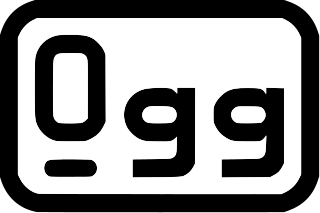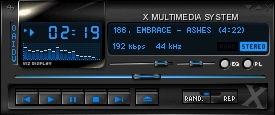
Ogg is a free, open container format maintained by the Xiph.Org Foundation. The authors of the Ogg format state that it is unrestricted by software patents and is designed to provide for efficient streaming and manipulation of high-quality digital multimedia. Its name is derived from "ogging", jargon from the computer game Netrek.

Vorbis is a free and open-source software project headed by the Xiph.Org Foundation. The project produces an audio coding format and software reference encoder/decoder (codec) for lossy audio compression, libvorbis. Vorbis is most commonly used in conjunction with the Ogg container format and it is therefore often referred to as Ogg Vorbis.
Windows Media Audio (WMA) is a series of audio codecs and their corresponding audio coding formats developed by Microsoft. It is a proprietary technology that forms part of the Windows Media framework. WMA consists of four distinct codecs. The original WMA codec, known simply as WMA, was conceived as a competitor to the popular MP3 and RealAudio codecs. WMA Pro, a newer and more advanced codec, supports multichannel and high-resolution audio. A lossless codec, WMA Lossless, compresses audio data without loss of audio fidelity. WMA Voice, targeted at voice content, applies compression using a range of low bit rates. Microsoft has also developed a digital container format called Advanced Systems Format to store audio encoded by WMA.

X Multimedia System (XMMS) is an audio player for Unix-like systems released under a free software license.
Speex is an audio compression codec specifically tuned for the reproduction of human speech and also a free software speech codec that may be used on voice over IP applications and podcasts. It is based on the code excited linear prediction speech coding algorithm. Its creators claim Speex to be free of any patent restrictions and it is licensed under the revised (3-clause) BSD license. It may be used with the Ogg container format or directly transmitted over UDP/RTP. It may also be used with the FLV container format.
Theora is a free lossy video compression format. It was developed by the Xiph.Org Foundation and distributed without licensing fees alongside their other free and open media projects, including the Vorbis audio format and the Ogg container.
The Xiph.Org Foundation is a nonprofit organization that produces free multimedia formats and software tools. It focuses on the Ogg family of formats, the most successful of which has been Vorbis, an open and freely licensed audio format and codec designed to compete with the patented WMA, MP3 and AAC. As of 2013, development work was focused on Daala, an open and patent-free video format and codec designed to compete with VP9 and the patented High Efficiency Video Coding.

High-Efficiency Advanced Audio Coding (HE-AAC) is an audio coding format for lossy data compression of digital audio defined as an MPEG-4 Audio profile in ISO/IEC 14496–3. It is an extension of Low Complexity AAC (AAC-LC) optimized for low-bitrate applications such as streaming audio. The usage profile HE-AAC v1 uses spectral band replication (SBR) to enhance the modified discrete cosine transform (MDCT) compression efficiency in the frequency domain. The usage profile HE-AAC v2 couples SBR with Parametric Stereo (PS) to further enhance the compression efficiency of stereo signals.

Sound Juicer is the official CD ripper program of GNOME. It is based on GTK, GStreamer, and libburnia for reading and writing optical discs. It can extract audio tracks from optical audio discs and convert them into audio files that a personal computer or digital audio player can play. It supports ripping to any audio codec supported by a GStreamer plugin, such as Opus, MP3, Ogg Vorbis, FLAC and uncompressed PCM formats. Versions after 2.12 implement CD playing capability. Last versions produce lossy formats with default GStreamer settings.
libavcodec is a free and open-source library of codecs for encoding and decoding video and audio data.
OggSquish is one of the first names used for the Ogg project developed from 1994 by the Xiphophorus company. Ogg Squish was also an attempt from the Xiphophorus company to create a royalty-free lossless audio compression codec.
Constrained Energy Lapped Transform (CELT) is an open, royalty-free lossy audio compression format and a free software codec with especially low algorithmic delay for use in low-latency audio communication. The algorithms are openly documented and may be used free of software patent restrictions. Development of the format was maintained by the Xiph.Org Foundation and later coordinated by the Opus working group of the Internet Engineering Task Force (IETF).
The HTML5 draft specification adds video and audio elements for embedding video and audio in HTML documents. The specification had formerly recommended support for playback of Theora video and Vorbis audio encapsulated in Ogg containers to provide for easier distribution of audio and video over the internet by using open standards, but the recommendation was soon after dropped.
HTML video is a subject of the HTML specification as the standard way of playing video via the web. Introduced in HTML5, it is designed to partially replace the object element and the previous de facto standard of using the proprietary Adobe Flash plugin, though early adoption was hampered by lack of agreement as to which video coding formats and audio coding formats should be supported in web browsers. As of 2020, HTML video is the only widely supported video playback technology in modern browsers, with the Flash plugin being phased out.

Opus is a lossy audio coding format developed by the Xiph.Org Foundation and standardized by the Internet Engineering Task Force, designed to efficiently code speech and general audio in a single format, while remaining low-latency enough for real-time interactive communication and low-complexity enough for low-end embedded processors. Opus replaces both Vorbis and Speex for new applications, and several blind listening tests have ranked it higher-quality than any other standard audio format at any given bitrate until transparency is reached, including MP3, AAC, and HE-AAC.
HTML audio is a subject of the HTML specification, incorporating audio input, playback, and synthesis, as well as speech to text, all in the browser.
Daala is a video coding format under development by the Xiph.Org Foundation under the lead of Timothy B. Terriberry mainly sponsored by the Mozilla Corporation. Like Theora and Opus, Daala is available free of any royalties and its reference implementation is being developed as free and open-source software. The name is taken from the fictional character of Admiral Natasi Daala from the Star Wars universe.

An audio coding format is a content representation format for storage or transmission of digital audio. Examples of audio coding formats include MP3, AAC, Vorbis, FLAC, and Opus. A specific software or hardware implementation capable of audio compression and decompression to/from a specific audio coding format is called an audio codec; an example of an audio codec is LAME, which is one of several different codecs which implements encoding and decoding audio in the MP3 audio coding format in software.







